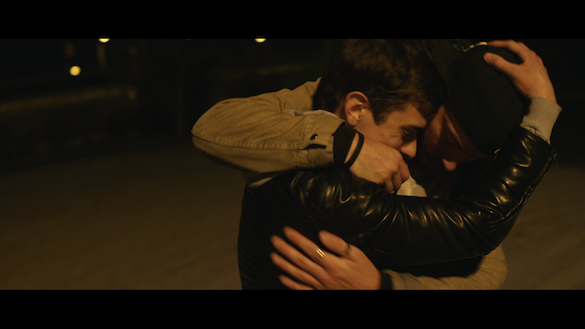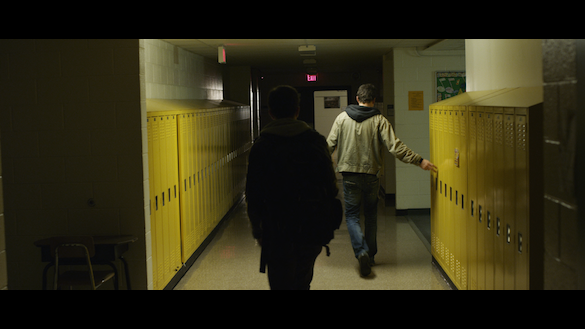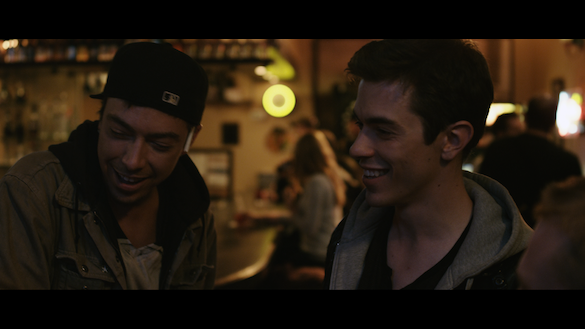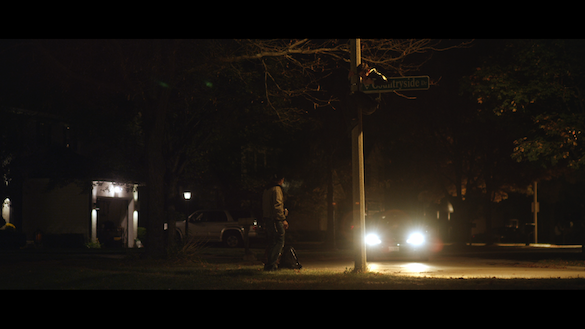Pure Rubbish: An Interview with Writer/Director Brad Bischoff (original) (raw)
Film Thu Mar 07 2013
Just after the new year, I started making a list of people I'd like to interview in 2013. The first person who came to mind was Brad Bischoff. Having just watched his latest film, he was fresh on my mind, but Brad's an auteur I've admired and respected for years. I met him in 2008 at Columbia College Chicago during the screening of his student film, Eyelids, and have watched his films (and progression as a storyteller) ever since. Most recently, I got involved in Brad's work as a Kickstarter funder for his latest project, Where the Buffalo Roam.

Where the Buffalo Roam was really great, man. I actually watched it for the first time with my parents and sister over the holidays. As a family, I think we all got something special and deeply personal out of it. I'm sure our familial, shared experience had a lot to do with the intimacy and sincerity you used while writing, directing (and acting in) it. According to IMDb, Buffalo marks your fifth film as writer and director. Besides a few commercial exceptions, you seem to prefer playing both roles on projects. Are they one in the same? How would you characterize the two?
Writing is a very isolated thing. And I like it that way because there's no one around telling you how weird it all sounds, or nonsensical it is. You have permission to dream and you can stay there for however long you want. Directing is a very different thing. At least, for a while it was. I always felt there was a certain way you had to act. A certain angle you needed to point your finger to get the crew thinking that you're not an idiot. But, I'm learning that was all wrong. That's why certain films are wrong. And it's getting much more beautiful for me. I don't pretend to have all the answers when I write, and I try to do the same when I direct. I choose to write and direct because I want to keep the dream dreaming. They were very beautiful to me when I was in my cave painting them, and I want people to see them that way.

Buffalo vignettes a few twilight hours in the lives of two brothers. You allude to pivotal events leading up to their night together, but leave things relatively vague — which works really well for a short film. In fact all your work up to this point has been very poetic, intimate short-form slices of life. What's kept you from longer projects? Funding? Timing? Preference?
The Feature Film is a club. And I always end up forgetting my ID when I show up there. But, I've been listening to all the music they play, I'm fucking ready to dance, and I got some friends inside who are waiting for me. Just a few more things, few more things, few more things... but it'll happen. I'm not concerned about money or time. I just want to make sure I'm ready.
Well I think you're ready in terms of vision and talent. And I'd happily and proudly help fund another (longer) film when the time comes. You seem to favor specific themes in your short films — nostalgia, memories, family — what about those topics interest you?
I'm a very forgetful person, really. I like to remember things. I like to see a photograph and remember that things were good once. Or listen to a voice recording and remember the dark hole it was recorded in. You learn from these things, or at least capture emotion in these things. I'm eager for human connection. Whenever I watch someone's home movies, I see it. Or when I look at people's photographs, or listen to someone tell a story. Or watch an old guy shuffle into the jazz club and sit next to me quietly. I like to know where people come from and why they are going to wherever it is they are going. I try not to let my past dictate how I live today, but it certainly allows me the ability to laugh, cry, blush or grit my teeth. And these emotions are what keep me going. And it helps me understand other people in a way.

So having worked exclusively in dramas — albeit fantastical, semi-autobiographical dramas — are there other genres you're interested in exploring? Anything you wouldn't touch?
Genres are like ice cream and pizza to me. I appreciate them all — maybe even love — but I will mostly stick to vanilla ice cream and cheese pizza. It's just what I like. I like fictional stories about real people, or fictional people living real stories.
Nicely put. But I'd still like to see your take on the horror genre! You mention the value of stories (real and fictional), who are your favorite storytellers?
Charles Bukowski, Chet Baker, Charlie Kaufman... they all just express what is coming from inside them. And they do it in different ways.
Your films have done really well in major international festivals like CIFF. In fact your student film, Eyelids took you to Festival de Cannes' short film corner. What's that been like?
The festival experiences have been interesting. I never went to a lot of parties in high school or college, but I imagine it was a similar feeling. Walking around uncomfortable at first, then having a beer. Then two, three, or four, and suddenly you're dancing. You're friends with them all for a few days after the whole thing is over, and then it's back to studying for tests.

Besides taking you to the festival circuit, your films — and film career — moved you to Los Angeles for a while too, right? Why did you return to Chicago?
I spent a little bit of time in LA with Nick Santore while I finished school. It was a nice place. A lot of people I talk to dislike it, but I smiled a lot while I was there, sang some karaoke, and saw my friend Jake Infusino a time or two. I decided to come back to Chicago because I was broke. But I would have anyway. I want to make films with the guys I grew up doing it with. We have a good thing. I feel if I were to spend some time in LA, which I still might, it would be for other reasons. Either selfish reasons or to wear another hat for a while.

Yeah, the Chicago team (and loyalty) behind your films is pretty amazing. Tell me more about the "good thing" you've built and where you see it going?
Rubbish was no more than a graffiti tag that my friend, Bob Zegler, and I used on the videos we produced back in high school together. It was a fun and beautiful thing. After high school, we met Nick Santore and Jake Zalutsky and kept producing more content together while working other jobs. It wasn't until Alex Hidalgo got involved that we really decided to make it a business. Maybe subconsciously as a viable way we could all stay together and create something in Chicago. Our goal has always been to keep making films together and having this company is certainly allowing us the opportunity to do that. It would be nice in the future to have a roster of directors on Rubbish, a production company that produces commercials, music videos and feature films.
I really respect what you guys are building and your dedication to the concept of a film collective. I mean, that's why I designed the official Rubbish t-shirt in the first place! Along with your independent work and music videos, Rubbish has a growing commercial portfolio with projects for major clients like Intel, Wrangler and Hammer. Do you see these films as sustenance or sacrifice?
My goal for a long time was to start a production company in Chicago. And with my best friends Alex, Nick, Jake and Bob, we were able to do that. We've been in business for a couple of years now, and the commercial side of things has been very interesting. I'm glad that we came into it from a storytelling perspective first, and business second. To keep it from becoming sacrificial, we just make sure our heads are in the right spot regarding the types of projects we choose. If we didn't like what we were doing, we wouldn't do it. I think we're all too bullheaded for that. I have no problem going back to packaging adult diapers. Well...
Ha! Please don't go back to that! Seriously though, I think it's easy for the average moviegoer to see the writer and/or director as the sole creative force behind their favorite films. But it's clear from how you describe Rubbish and the camaraderie you seem to have as team, that everything's a big group effort — a family affair. Can you explain how less-considered roles like production designer and cinematographer bring films to life?
Nick Santore and Jake Zalutsky are vital to the films Rubbish makes — more so now than ever. We have conversations we wouldn't touch upon before. We talk about the meaning of it all. The building of a world to live in for a while. What people need to understand is that they are not "just" a production designer or a cinematographer. And that's why their work is great, including their own personal work. They transcend the pointless titles that are given — I don't see them with those titles. And I think any great collaborator would understand that.
Absolutely. Before I let you go, I want to circle all the way back to the start of the interview and hear your thoughts on using Kickstarter to fund Where the Buffalo Roam.
Friends and family. I'd be nothing without them. They're always there for me when I need it most. And the Kickstarter experience reminded me of that. It's really nice to know people want to support you. I didn't know everyone that donated, but I truly thank them all. It was a very important film for me, and it's nice to know that people wanted to see it get made.
